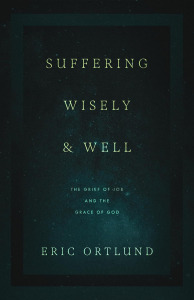Wednesday, October 11, 2023

 As part of the student fellowship program at the Center for Apologetics and Cultural Engagement, we work with our student fellows to develop book reviews about significant books that overlap their interests with those of the Center. The following review of Eric Ortlund’s Suffering Wisely and Well is part of that ongoing initiative.
As part of the student fellowship program at the Center for Apologetics and Cultural Engagement, we work with our student fellows to develop book reviews about significant books that overlap their interests with those of the Center. The following review of Eric Ortlund’s Suffering Wisely and Well is part of that ongoing initiative.
As followers of Christ, we are called to bring comfort to those who suffer. Yet we often attempt to do this in the wrong ways. We are quick to throw out nice-sounding platitudes as if we are offering insightful wisdom, when in fact we are doing the opposite. In Suffering Wisely and Well, Eric Ortlund explores the topic of suffering through the account of Job, offering Christians insight on how to suffer well themselves and to comfort family members, friends, or church communities who do.
Ortlund begins by distinguishing the reasons behind why suffering occurs, showing how the suffering of Job is unique. From the start of the book, Job is described to be in right standing with God. Therefore, Job is not suffering as a means of spiritual correction, which clashes with traditional understandings of suffering. Yet Ortlund states that it is “only in a Job-like ordeal [that] we experience the all-sufficiency of God himself as a reality, not a theory” (58). God allowed Satan to remove all the secondary blessings he had given to Job, leaving Job to cling only to God Himself. Despite the pain, frustration, and confusion Job experienced, he refused to curse God. Job remained faithful throughout his affliction, displaying exemplary faith.
In contrast to Job’s exemplary faith, Job’s friends display spiritual immaturity, speaking from a place of fearful ignorance. They provide an example of how Christians should not respond to a fellow believer who is suffering. Though suffering has no easy answer or quick fix, Job’s friends tried to solve Job’s suffering as swiftly as possible. Because Job’s friends could not admit their limited perspective of Job’s situation, they were unable to speak properly about God. As the discourse unravels, they project their own fears onto Job, casting judgment while silently hoping not to be subjected to the same pain and suffering that Job was experiencing. Job’s friends never consider the possibility that Job simply loves God for who God is, not what He provides. In contrast, Job recognizes his place before God as one of humble gratitude, as should we.
Moreover, Job’s forty-two long chapters force the reader to wait patiently alongside Job for a response from God. This is the wisdom of the book of Job. We often seek to rush through or explain away suffering; however, these are not options in the book of Job or in the lives of believers. Ortlund shows how journeying alongside Job provides an example to believers of how to best interact with those suffering. While it may be difficult to sit silently in the ashes with God’s children while they are suffering, our silence can be tremendously impactful.
Perhaps the only other encouragement Christians can provide to tend gently to the wounds of any sufferer is an understanding of God’s intimate relationship with both the sufferer and suffering itself. Believers experience intense suffering in the world; yet, as Ortlund reminds us, “this is but a whisper, the barest hint of the suffering that his Son lovingly bore for our sake” (115). Jesus put on flesh and suffered the greatest physical and emotional torture possible—the cross. Therefore, when Christians discuss why God would allow suffering, we must not forget God is the great high priest who is able to sympathize with His children because He chose to endure the greatest suffering (Heb 4:15). The same God who allowed Job to suffer is the same God who understands his pain greater than anyone else.
Ortlund illuminates how God provides Job with something far greater than mere consolation: he gives Job restoration. God restores Job using rhetorical questions, each revealing another layer of who God is and how in tune He is with not just Job’s suffering but all suffering. Using the detailed imagery of the Behemoth and Leviathan, God contrasts the chaotic powers of the world with Himself: “Leviathan looks at spears and swords like straw (41:26), but God looks at Leviathan like straw” (159). Through this new and greater understanding Job has of God, Job finds peace. Nothing less than God Himself could restore Job, and nothing less can restore any of God’s suffering servants today.
Suffering Wisely and Well is a great tool for seasoned followers of Christ. Mature believers who are enduring suffering would find this book a fresh reminder that God is present in the midst of their pain. For scholars in the fields of pastoral leadership, biblical studies, or apologetics, Eric Ortlund constructs a robust framework to better navigate conversations around suffering and to comfort those who mourn. Moreover, church staff, including pastors, deacons, and elders, would find this work helpful to help walk with those in desert seasons. Suffering Wisely and Well offers powerful insights to better enable us to stand with those who suffer as we are reminded of God’s sovereignty and response to all cosmic evil.
Chase Matthews is a first year seminary student from Colorado, pursuing a Masters of Divinity with a concentration in Healthcare Chaplaincy. The Lord has burdened his hear to become a hospital chaplain, bringing the message and presence of Christ with those who are experiencing suffering and grief.